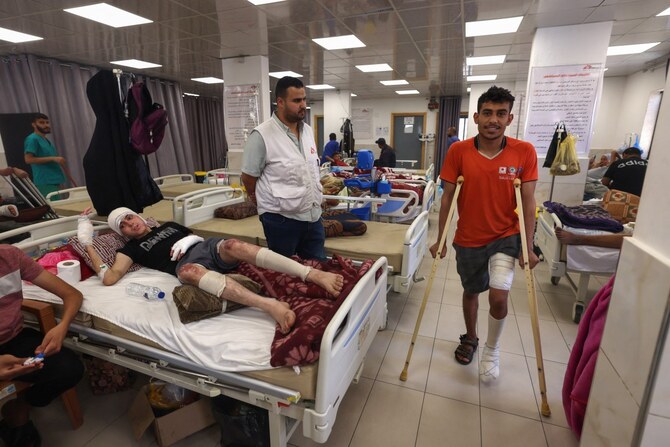A new analysis by the World Health Organization (WHO) underscores the severe and unmet rehabilitation needs in Gaza, with at least 22,500 individuals estimated to have life-changing injuries requiring long-term rehabilitation.
The report, titled "Estimating Trauma Rehabilitation Needs in Gaza using Injury Data from Emergency Medical Teams," highlights the devastating impact of the ongoing conflict on Gaza’s health system.
The WHO analysis identifies severe limb injuries as a primary driver of rehabilitation needs, estimating between 13,455 and 17,550 cases. The report also notes between 3,105 and 4,050 limb amputations and a significant increase in spinal cord injuries, traumatic brain injuries, and major burn injuries, affecting thousands of women and children.
Dr. Richard Peeperkorn, WHO Representative in the occupied Palestinian territory, emphasized the dire situation: "The huge surge in rehabilitation needs occurs in parallel with the ongoing decimation of the health system. Patients can’t get the care they need. Acute rehabilitation services are severely disrupted and specialized care for complex injuries is not available, placing patients' lives at risk. Immediate and long-term support is urgently needed to address the enormous rehabilitation needs."
As of now, only 17 of Gaza's 36 hospitals remain partially functional. Primary health care and community-level services are often suspended or inaccessible due to insecurity and frequent attacks. Gaza’s sole limb reconstruction and rehabilitation center, located at Nasser Medical Complex and supported by WHO, has been non-functional since December 2023 due to shortages of supplies and specialized staff. The center was further damaged in a raid in February 2024. Reports indicate that 39 physiotherapists have been killed as of May 10, exacerbating the crisis. Essential assistive products such as wheelchairs and crutches are in short supply, with existing stocks depleted and difficult to replenish.
The WHO analysis focuses on injuries sustained since the escalation of hostilities in October 2023. However, the situation is compounded by tens of thousands of Palestinians who already lived with chronic conditions and impairments prior to the conflict, now facing heightened risks due to the inadequate availability of services.
The WHO and its partners will use these estimates to plan for increased rehabilitation services and inform long-term health planning. Amid the ongoing conflict, ensuring access to essential health services, including rehabilitation, is crucial to prevent further illness and death. The WHO has reiterated its call for a ceasefire to facilitate the rebuilding of Gaza’s health system and address the escalating needs of the population.
The report, titled "Estimating Trauma Rehabilitation Needs in Gaza using Injury Data from Emergency Medical Teams," highlights the devastating impact of the ongoing conflict on Gaza’s health system.
The WHO analysis identifies severe limb injuries as a primary driver of rehabilitation needs, estimating between 13,455 and 17,550 cases. The report also notes between 3,105 and 4,050 limb amputations and a significant increase in spinal cord injuries, traumatic brain injuries, and major burn injuries, affecting thousands of women and children.
Dr. Richard Peeperkorn, WHO Representative in the occupied Palestinian territory, emphasized the dire situation: "The huge surge in rehabilitation needs occurs in parallel with the ongoing decimation of the health system. Patients can’t get the care they need. Acute rehabilitation services are severely disrupted and specialized care for complex injuries is not available, placing patients' lives at risk. Immediate and long-term support is urgently needed to address the enormous rehabilitation needs."
As of now, only 17 of Gaza's 36 hospitals remain partially functional. Primary health care and community-level services are often suspended or inaccessible due to insecurity and frequent attacks. Gaza’s sole limb reconstruction and rehabilitation center, located at Nasser Medical Complex and supported by WHO, has been non-functional since December 2023 due to shortages of supplies and specialized staff. The center was further damaged in a raid in February 2024. Reports indicate that 39 physiotherapists have been killed as of May 10, exacerbating the crisis. Essential assistive products such as wheelchairs and crutches are in short supply, with existing stocks depleted and difficult to replenish.
The WHO analysis focuses on injuries sustained since the escalation of hostilities in October 2023. However, the situation is compounded by tens of thousands of Palestinians who already lived with chronic conditions and impairments prior to the conflict, now facing heightened risks due to the inadequate availability of services.
The WHO and its partners will use these estimates to plan for increased rehabilitation services and inform long-term health planning. Amid the ongoing conflict, ensuring access to essential health services, including rehabilitation, is crucial to prevent further illness and death. The WHO has reiterated its call for a ceasefire to facilitate the rebuilding of Gaza’s health system and address the escalating needs of the population.


















